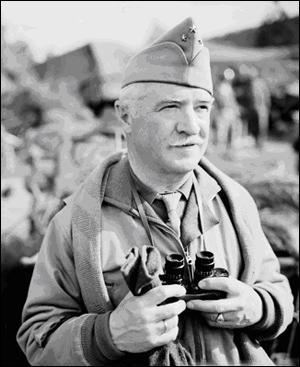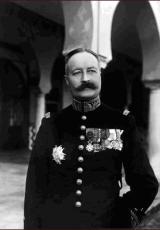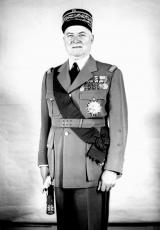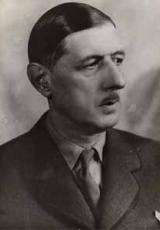Joseph de Goislard de Monsabert

(30th September 1887: Libourne, Gironde 18th June 1981: Dax, Dordogne)
Joseph de Goislard de Monsabert came from a military family who lived with an ethos of honour and serving their country. Carrying on these traditions, the young man soon responded to the call of the military, preparing for the Saint-Cyr special military college, where he enrolled in October 1907 (class of Morocco) after having tried the military profession for a whole year with the 50th infantry regiment. Attracted to North Africa, he chose to serve in Morocco where, in 1912, he joined the 3rd regiment of tirailleurs. He was a Lieutenant when the First World War broke out, appointed to the 1st mixed regiment of tirailleurs and zouaves of the 1st Moroccan division. In May 1915 he was a Captain, distinguishing himself in the 9th regiment of zouaves, where he ended the war as acting Battalion Chief, crowned with seven citations and the Légion d'Honneur. The period between the wars was the opportunity to take a course at the Ecole supérieure de guerre (Upper War Academy) and deepen his knowledge of the Maghreb, where he did not take long to become an expert.
Made Colonel in June 1937, he was in charge of the 9th RT at Miliana at the beginning of the Second World War when he was promoted to Commander of the Southern Tunisian unit (81st infantry brigade) at Blida in December. Forced to accept the armistice, Monsabert was resolved not to give up the struggle. In August 1941 he was a General, ensuring the continuation of the African army in order to serve alongside the Allies when the time came, preparing for the arrival of General Giraud in Blida following the landing in North Africa in November 1942. Banished by the Vichy regime, he took command of the African Free Forces and then the 19th army corps during the Tunisian campaign. In March 1943, he was Division General and took command of the 3rd Algerian infantry division, taking the whole summer to lead them across the Western Algerian desert, to the appreciation of his superiors and his men. In December, he set off from Bizerte for Nisida. As part of General Juin's French expeditionary Corps to Italy (Corps expéditionnaire français en Italie or CEFI), the "Africans" took up position in the Abruzzo. His unit, engaged in the mountains to the north of Venafro, had to endure the rigours of winter and the determination of the enemy, who had to retreat around the edges of Monna Casale to Acquafondata and the other side of the Rapido. Most importantly, he took the Belvedere Crest, which earned him his first citation on the order of the army. The American troops, unable to break down the fort of Monte Cassino, accepted General Juin's plan of a surrounding manoeuvre by troops of the CEFI. On the 12th May, his troops took Castelforte, crossing the Aurunci mountains within a few days. The Allies arrived in Rome on the 5th June. Fighting continued along Lake Bolsena and, across the Amiata, the 3rd DIA took Sienna on the 3rd July. After Italy came France, whose men landed in Toulon on the 16th August, taking part in the retaking of the town (21st August) and then of Marseille (28th August). Monsabert was made a citizen of honour of Marseille and promoted by General de Gaulle to the dignity of Great officer of the Légion d'Honneur.
Appointed Lieutenant General of the Army, he took command of the 2nd CA, continuing his reconquering mission: Saint-Etienne, Lyon, Mâcon, Chalon, Autun and Dijon fell. He took control of the Vosges and Alsace campaigns and took part in the defence of Strasbourg against a pocket of German resistance, crossing the Lauter and the Rhine to celebrate victory in Stuttgart. Monsabert was Superior Commander of the Occupying Troops in Germany on the 24th July 1945 and rose to the rank of Army General, receiving the Military Medal and becoming a Great Cross of the Légion d'Honneur. He retired from active service in 1946, to his Toureil home in Hastingues (Landes) where he devoted himself to defending the French army, both through writing Il faut refaire l'Armée française (We must change the French Army)(Paris, 1950), and in politics, through his election as MP for the Basses-Pyrénées region between 1951 and 1955. On the 8th July 1985, the city of Bordeaux paid tribute to its famous son. Charles Hernu, then minister for the Defence, unveiled a monument in memory of General de Monsabert in the Place des Martyrs de la Résistance.




